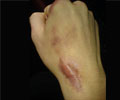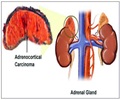The androgen receptor, which is known to be pivotal to the action of male hormones such as testosterone, has been found to play a crucial role in the body's ability to heal, say scientists at .
The University of Rochester Medical Center in studies in mice, found that the receptor delays wound healing.When scientists used an experimental compound to block the receptor, wounds healed much more quickly.
Scientists have said that not only the results in mice offer new insights into a potential new way to help the body heal faster, they stress that more research must be done before considering whether to explore the treatment in people whose wounds are slow to heal.
"This is a very interesting observation. For people at the marginal end of health - the elderly, or people who have impaired healing for other reasons, such as diabetes - maybe blocking the androgen receptor in certain cells could speed up wound healing and help prevent infections," said Dr. Edward Messing.
Led by Dr. Chawnshang Chang, the work thrusts a sex hormone front and center into one of the most important and pervasive processes of the body.
By identifying the androgen receptor as a key player in at least one form of inflammation, the study opens a new window for scientists investigating differences between the genders when it comes to autoimmune or inflammatory diseases.
Advertisement
To block the receptor and speed healing, the team used ASC-J9, a synthetic chemical compound loosely based on a compound found in curry that can shut down the receptor selectively.
Advertisement
The team created different types of mice, turning off the androgen receptor in certain cell types while leaving it functional in other cells.
Then scientists applied ASC-J9 to block the activity of the androgen receptor and studied the effects.
The team found that the androgen receptor spurs white blood cells known as macrophages to produce a chemical messenger called TNF-alpha, which in turn stimulates the body's inflammatory response.
The receptor also plays a role recruiting macrophages to the site of injury.
When the team blocked the receptor, there were fewer macrophages and less TNF-alpha at the wound site, and the wound healed much more quickly.
"It is a surprise that the androgen receptor is involved in wound healing in so many ways. People have suspected that the receptor plays a role in wound healing, but it's new that it plays a direct role guiding circulating macrophages to the area," said Chang.
The study has been published in the latest issue of the Journal of Clinical Investigation.
Sou















